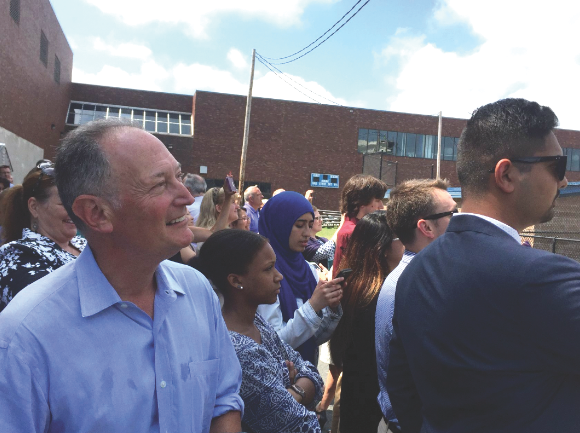September 7, 2017

Barry Mills, interim chancellor of UMass Boston, watches as the final steel beam is placed on the campus’ first dorm. Fred Thys/WBUR photo.
The fall semester began Tuesday at the University of Massachusetts Boston and classes are kicking off amid a number of financial challenges as the campus struggles to manage a structural debt in the multimillions.
Those struggles led to the resignation of longtime campus chancellor Keith Motley this summer, as well as his replacement by interim Chancellor Barry Mills, who has begun making cuts to balance the budget.
Fifty-one faculty and staff members have taken early retirement, and campus unions have asked Mills to start making cuts in the top administration. He said he’s considering such moves.
“We are looking at the whole top level of the administration of the university to try to understand how we get more efficient and be excellent with fewer folks,” Mills said.
The school will also close a dining hall and a daycare center. The professional staff union said eight workers at the daycare facility were told they will be laid off in December. Mills said he expects the campus to save half a million dollars a year by closing the center.
“There were no faculty members’ kids at the childcare center,” he said. “There are only a handful of young kids who are kids of staff members, and another small handful of kids of students.”
UMass Boston ended its fiscal year this summer with a deficit of slightly less than $10 million. But, Mills said, there’s a structural deficit of $30 million. “And our goal is to try to reduce that deficit to about $5 million this year, which from where I sit is about break even,” he said.
Mills would not say what additional cuts he’s contemplating, or from where he hopes to draw additional revenue.
But Anneta Argyres, who directs the UMass Boston Labor Extension Program and is vice president of its Professional Staff Union, sees the deficit differently. “The amount of money that UMass Boston brings in through tuition and fees, through state appropriations, through grants is sufficient to cover the expenses of running the university and educating our students,” she said. “If you just look at that, we’ve been into the black. What’s been driving us recently into the red is dealing with the debt of rebuilding the campus.”
Argyres has argued that interest payments and the depreciation of buildings are what’s driving the budget woes. She added that the state should pick up those costs of construction. UMass trustees have insisted that those costs be paid for out of the operating budget.
As students returned to school on Tuesday, the campus was very much an active construction site. Work to bury the utilities continues in preparation for taking down an unstable garage and substructure built in the 1970s. Mills said that project should be completed next summer.
“Because all the utilities run through that substructure, they have to be relocated,” he said. “That’s been an enormously expensive, complicated, long-running project.”
The university’s first dormitory, also under construction, is expected to open a year from now. Mills said UMass Boston is currently attempting to enroll the approximately 1,000 students who are expected to live in it. “Our goal is that the dorm will be primarily populated with freshmen,” he said.
Mills added that the school is setting aside money to cover costs for students who could not otherwise afford to live in the dorm. He is not ruling out additional dorms if there is a huge demand for them. “If it shows positive results in terms of student experience and retention, and if it makes good sense for this to be more of a residential community, then I think there’s a strong case for it being a more residential place,” Mills said. “Asking me, I still believe that there’s a huge importance to this university supporting its historic students who have commuted to this place.”
Students who trickled onto campus over the last few days are concerned about the school’s financial problems. Said Brian Fitzpatrick, who will be commuting to school via the Red Line: “I’m worried that the administration is not going to take our cost-of-living concerns seriously.”
Fitzpatrick just moved from Springfield to Cambridge to begin work on his master’s degree in economics. He wonders if he’ll make enough as a graduate assistant to support himself.
Faculty members have another worry: layoffs.
“They’re pushing for larger classes,” said Joseph Ramsey, who teaches English and American Studies and also serves on the executive committee of the faculty-staff union. “We’re worried that in the next few days, a lot of classes will be labeled under-enrolled and canceled by the administration. But these are often classes that are not in fact under-enrolled. These are classes that are small for a good reason, or are courses that will historically fill even in the next couple of weeks.”
A spokesman said the school will raise the student-to-faculty ratio slightly.
This story was first published on Sept. 5 on the website of WBUR 90.9 FM, Boston’s NPR News Station. The Reporter and WBUR have formed a partnership in which the two news organizations will share resources to collaborate on stories.


